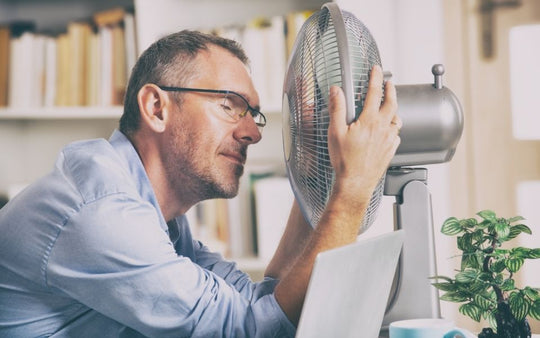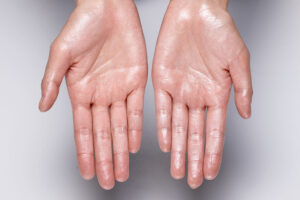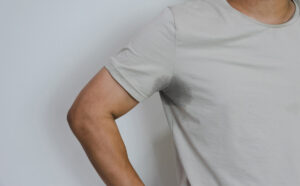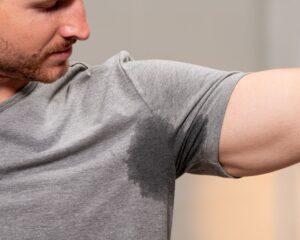Ever wondered why your head sweats after intense workouts or spicy meals? You’re definitely not the only one.
Our bodies naturally regulate temperature through sweating, functioning like built-in air conditioners. But the head often seems to have its own unique response to heat, leading to sweating. Your head sweats due to numerous sweat glands densely packed in the scalp, actively working to cool us down when the temperature rises.
Various factors can trigger excessive craniofacial sweating, from hot weather to spicy cuisine. Emotional states also play a significant role—feelings of anxiety or nervousness can significantly increase sweating, a phenomenon familiar to many during stressful situations like dates or job interviews.
If you’re tired of not knowing why your head sweats and want to learn what to do about it, follow this practical advice to help you manage excessive head sweating.
Head Sweating A-Z
What Causes Excessive Sweating of the Head and Face?
If you’ve been wondering what causes excessive sweating of the head and face, you should first know that the way our head sweats may differ.
Occasional head sweating is a common and natural response to certain conditions. Your head sweats because your body needs to cool down during warm weather, physical exercise, or in a heated environment. This type of sweating is your body’s innate cooling mechanism, subtly activating to maintain an optimal temperature.
Hyperhidrosis on the other hand is a step beyond normal sweating. This medical condition involves excessive sweating even in the absence of heat or physical exertion. It’s as though your sweat glands are constantly active, leading to a consistent and often uncomfortable level of sweat on the scalp.
The reasons for craniofacial hyperhidrosis can vary. It may be a result of genetic factors, indicating a predisposition in your family history. Alternatively, it could be an indication of an overactive sympathetic nervous system. Regardless of the cause, understanding why your head sweats and managing this condition is crucial for those affected.
Lifestyle Changes to Manage How Much Your Head Sweats
Hydration and Diet
Believe it or not, what you eat and drink plays a big role in how much your head sweats. Staying well-hydrated helps your body maintain a cool temperature, potentially reducing excessive sweating. Also, certain foods and beverages, like caffeine and spicy foods, can trigger more sweat. Incorporating a balanced diet with plenty of water can be a simple yet effective way to manage head sweating.
Exercise
Exercise is great for health, but it can turn your head into a mini fountain. To keep things under control, try wearing moisture-wicking headbands or hats during workouts. Also, choosing the right time for exercise—like in the cooler parts of the day—and staying hydrated can help manage sweat during physical activities.
Hair and Scalp Care
The way you care for your hair and scalp can impact how much your head sweats. Opt for light, breathable hairstyles that allow air circulation. Additionally, using shampoos and products designed for oily or sweaty scalps can help in keeping your head drier and more comfortable.
Stress Management

Since stress can trigger head sweating, incorporating stress management techniques into your routine can be beneficial. Practices like yoga, meditation, or even simple breathing exercises can help in reducing stress levels, subsequently minimizing head sweating.
Adequate Sleep
Getting enough sleep is crucial for overall health and can also affect how much your head sweats. A well-rested body regulates temperature more efficiently, which can help in reducing night sweats and excessive sweating during the day.
Avoiding Triggers
Identifying and avoiding personal triggers that cause your head to sweat can be a practical approach. This could mean staying away from overly warm environments, reducing your intake of hot beverages, or avoiding social situations that provoke anxiety or nervousness. Being mindful of these triggers and managing your environment accordingly can significantly help in reducing head sweating.
Home Remedies and Natural Solutions
Herbal Remedies
Nature has its own toolkit for managing sweat. Herbs like sage, which has natural antiperspirant properties, can be used in teas or as supplements. Witch hazel, applied directly to the scalp, can act as a natural astringent, reducing sweat production.
Sweat-Absorbing Head Wraps and Caps
Getting crafty can also help manage head sweating. Homemade sweat-absorbing head wraps or caps can be both stylish and functional. Materials like cotton or bamboo fabrics are excellent for absorbing moisture and keeping your head dry. Plus, they can be a fun fashion statement!

For those of you looking for a ready-made product they can buy, search for options with built-in sweatbands or those made from sweat-wicking materials. They can help absorb excess moisture while keeping hair and sweat out of your eyes. Plus, with the myriad of designs and colors available, you can make a fashion statement while staying dry.
Medical Approaches to Excessive Head Sweat
Prescription Antiperspirants
If your head sweats a lot, it’s natural that you want to find the best solutions to prevent it from happening in the first place.
For those who find regular antiperspirants inadequate, prescription options offer a stronger solution. These contain higher concentrations of active ingredients like aluminum chloride, effectively blocking sweat glands. However, they are not a one-size-fits-all remedy.
It’s important to consult a dermatologist to understand if they’re right for your skin type and the severity of your condition. These antiperspirants can be particularly effective for people with mild to moderate hyperhidrosis.
Iontophoresis
Iontophoresis is a treatment that uses a mild electrical current to reduce sweating. Though more commonly used for hands and feet, recent advancements have made it applicable for the scalp as well. This treatment requires multiple sessions and may be recommended for those with moderate to severe hyperhidrosis. The process is generally safe, but it’s crucial to get it done under medical supervision.
Botox
Botox, widely known for its cosmetic applications, is also FDA-approved for treating severe head sweating. By temporarily blocking nerves that trigger sweat glands, Botox can significantly reduce sweating. The procedure involves multiple injections in the scalp and provides relief for several months. A healthcare provider can determine if this is an appropriate treatment for you, considering factors like medical history and sweat severity.
The Psychological Impact of Head Sweating
Coping With Social Anxiety and Embarrassment
In general, the more your head sweats the more self-conscious you feel. Excessive head sweating can be more than a physical issue; it often carries emotional and psychological burdens. The fear of visible sweating can lead to social anxiety and embarrassment, affecting personal and professional interactions.
It’s important to acknowledge these feelings and explore coping strategies like mindfulness, stress management techniques, or joining support groups where you can share experiences and learn from others facing similar challenges.
When to Seek a Therapist

If your head sweats a lot, and this significantly impacts your mental health and daily life, seeking professional help can be a beneficial step. Therapists or counselors specializing in anxiety or body image issues can provide valuable support and coping mechanisms. They can also help in building confidence and developing a more positive self-image, which is essential for managing the psychological effects of excessive sweating.
Your Questions Answered
Why does my head sweat more than other body parts?
The reason your head sweats more than other parts is largely due to the high concentration of sweat glands in your scalp. This area is packed with glands that respond quickly to changes in body temperature, emotions, or physical activity, leading to more noticeable sweating.
What triggers excessive head sweating?
Excessive head sweating can be triggered by a variety of factors. Why your head sweats excessively may be due to hot weather, spicy foods, physical exercise, stress, or anxiety. It’s your body’s natural way of regulating temperature and responding to emotional stimuli.
Is it normal for my head to sweat during sleep?
Occasional head sweating during sleep can be normal, especially in a warm environment. However, if you frequently wonder why your head sweats at night, it might be a sign of a medical condition like hyperhidrosis or a response to certain medications.
Can diet affect how much my head sweats?
Yes, your diet can influence why your head sweats. Spicy foods, caffeine, and alcohol are known to stimulate sweat glands. A balanced diet with less spicy and processed foods may help reduce excessive sweating.
Can stress and anxiety cause my head to sweat more?
Absolutely. Stress and anxiety are significant factors in why your head sweats. They activate your sympathetic nervous system, increasing sweat production as a response to emotional stress.
Why does my head sweat when I eat spicy food?
Your head sweats when eating spicy food due to the activation of certain receptors in your body. These receptors respond to the heat of the spices, triggering your sweat glands to cool your body down.
Can head sweating be a sign of a serious health issue?
While occasional head sweating is usually not a concern, persistent or excessive sweating could be. Why your head sweats excessively might be a symptom of conditions like hyperhidrosis or hormonal imbalances. It’s always best to consult a healthcare provider for persistent issues.
Remember that while head sweating is a common issue, there are numerous ways to manage it effectively. Whether through lifestyle adjustments, home remedies, advanced clothing technologies, medical treatments, or addressing the psychological impacts, you have a variety of options at your disposal.
You might also like...

10 Simple Hacks to Prevent Unwanted Boob Sweat
Table of Contents Sweltering summer weather. Intense workouts. First dates. Test jitters. Sweaty boobs. It’s true – lots of situations

How to Prevent Thigh Chafing – 9 Tips and Secrets
Table of Contents A romantic walk along a sandy beach, a scenic afternoon hike, or a stroll through the mall.

How to Stop Sweating So Much? 9 Tips to Beat Unwanted Sweat
If you’ve ever suffered through an awkward sweaty hug, a slippery handshake, or a sweat-soaked job interview — this article
















